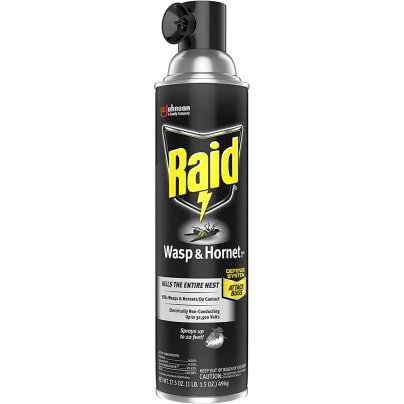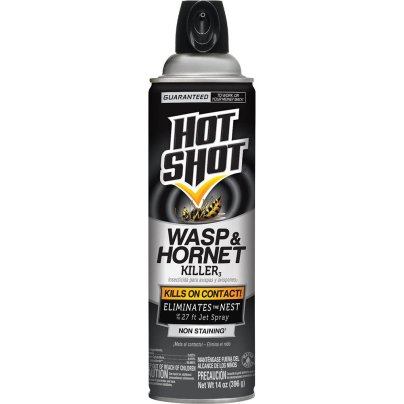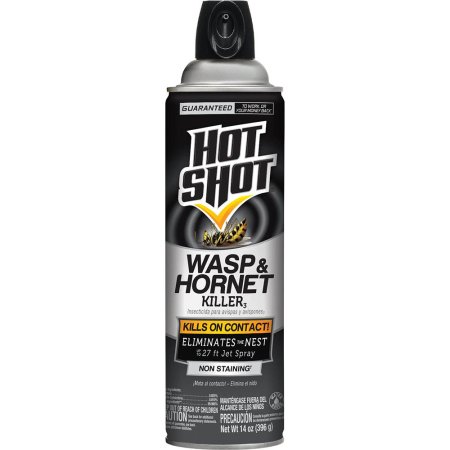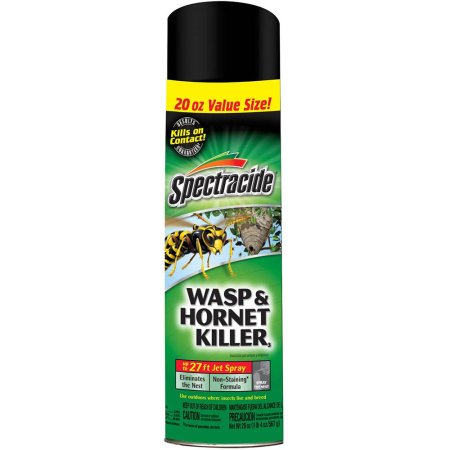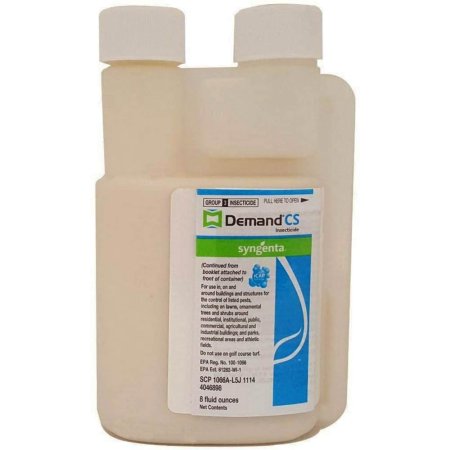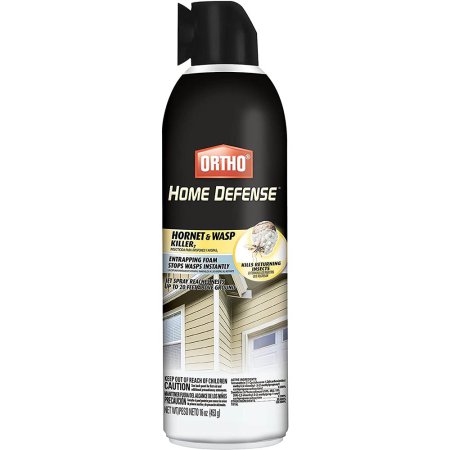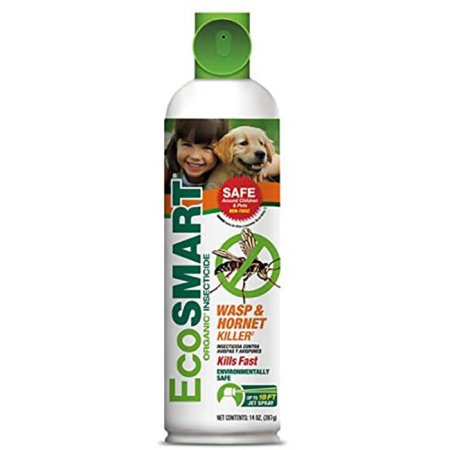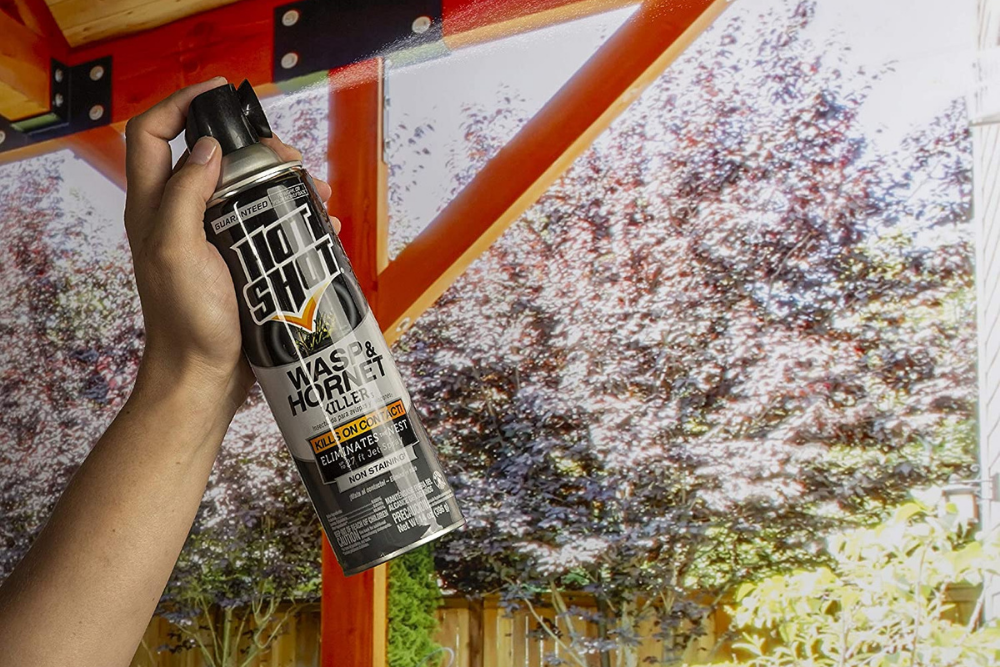
We may earn revenue from the products available on this page and participate in affiliate programs. Learn More ›
If you’re noticing more wasps too close for comfort in your outdoor living spaces, or even invading your home, it might be time to solve your wasp problem. Whether they’re hiding between the vinyl in your eaves or building a nest under your covered porch, you need a powerful wasp spray to put an end to this winged assault.
The best wasp spray will kill on contact and from a safe distance, keeping the user out of harm’s way as they perform their grim job. These potent pesticides use a blend of neurotoxins that attack a wasp’s nervous system, rendering it paralyzed on contact. When sprayed into a nest, the substance will coat the hive, killing wasps returning to the hive hours later.
If you need a solution to your wasp problem, read on to learn which type of wasp spray is right for your home, and don’t miss our list of some of the best wasp sprays you can buy.
- BEST OVERALL: Raid Wasp and Hornet Killer, 17.5 OZ (Pack of 3)
- BEST BANG FOR THE BUCK: Hot Shot 13415 Wasp & Hornet Killer
- BEST SPRAY CAN: Spectracide Wasp and Hornet Killer 20-Ounce 2-Pack
- BEST CONCENTRATE: Syngenta 73654 Demand CS Insecticide
- BEST FOAM:Ortho Home Defense Hornet & Wasp Killer
- BEST ORGANIC INSECTICIDE: EcoSMART Organic Wasp and Hornet Killer
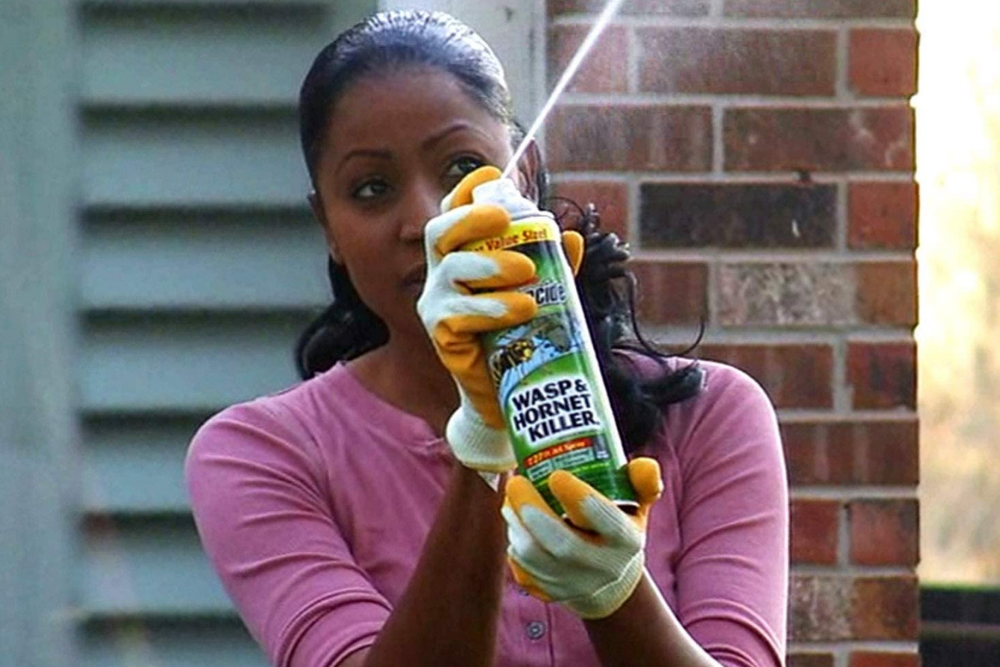
Types of Wasp Spray
While most wasp sprays use the same chemicals to perform their job, sprays come in three forms.
Spray
Wasp sprays contain powerful pyrethroids and pyrethrins that will effectively paralyze a wasp on contact, preventing it from retaliation by stinging the user. These sprays allow you to stand a reasonably safe distance of up to 27 feet away, reducing the odds that you’ll be stung. As wasps tend to make their nests in the eaves of your home, this long range allows you to reach the nest without having to use a ladder, which could be dangerous should you need to make a hasty retreat.
Of course, blasting a nest from 27 feet away takes some skill. The further away you are, the harder it is to aim the spray accurately, causing waste or, worse, leaving enough wasps alive to mount a counterattack.
A thorough approach works best when using a spray. A few spurts aren’t enough. Keep the nozzle depressed and coat the entire nest to ensure all wasps are disabled to prevent any from retaliating or escaping to build a hive in some other location near your home.
Aerosol Foam
Aerosol Foam sprays work similarly to standard sprays, only the liquid creates a foam on contact, trapping the wasps, then paralyzing them with chemicals. The foam expands after it hits a nest, increasing the pesticide’s coverage and ensuring fewer wasps escape. While aerosol foams provide better coverage than standard sprays, they have shorter ranges of up to 20 feet.
Liquid Concentrate
For smaller problems, a simple can of spray or aerosol foam will get the job done. Unfortunately, wasps can be persistent pests, returning to make nests in various nooks and crannies around your home’s exterior. If you have a recurring wasp problem, you may need a large supply of wasp killer on hand to keep the wasps at bay. One bottle of liquid concentrate can make up to 40 gallons of spray, offering a much better value than the spray-ready products. Concentrates are also typically effective against a broader range of insects than canned sprays, allowing you to take out ants, roaches, and a whole host of other pests.
Concentrates do have their downsides. You must mix the concentrate with water before using it, which can be a hassle. You’ll also have to purchase a sprayer to apply a liquid concentrate once mixed. A liquid concentrate pesticide also won’t have the same range as aerosol because it is not compressed in a can. This means you’ll need to stand much closer to the nest when applying the pesticide, making you more vulnerable to stings.
Our Top Picks
The products below kill wasps on contact, with most allowing you to remain at a safe distance when doing so. This list includes some of the best wasp sprays from the most well-known names in pest control.
Best Overall
Raid Wasp and Hornet Killer, 17.5 OZ (Pack of 3)
Unleash destruction on that wasp’s nest threatening your home while standing at a safe distance with this wasp killer from Raid. This 17.5-ounce can boasts an impressive 27-foot range, allowing you to hit high eaves and window casings without having to teeter dangerously on a ladder. You can also stand well away from lower-level hives, minimizing the chances of being stung. Raid also includes a higher percentage (0.05 percent) of cypermethrin, the neurotoxin that kills wasps, than most other pesticides.
This pack includes three 17.5-ounce cans, making sure you have plenty of backup should the pests return to take up residence in another part of your home. In addition to killing hornets and wasps, this pesticide will also kill mud daubers and yellow jackets. This spray is safe for indoor or outdoor use, but keep it away from eating surfaces and food.
Best Bang For The Buck
Hot Shot 13415 Wasp & Hornet Killer
Hot Shot’s 14-ounce spray can features an impressive 27-foot range, allowing you to hit both low and high spots on your home’s exterior with ease without having to get too close to the hive. You also don’t need to worry about discoloring the siding or trim on your home’s exterior, as this product is stain free.
Hot Shot kills on contact. Simply aim the narrow stream at the hive entrance, then expand to cover the whole nest. This pesticide also lingers, killing wasps that return to the hive days later. In addition to killing wasps, this product will also eliminate hornets, yellow jackets, tent caterpillars, and scorpions for those living in the Southwest. This product is safe for outdoor use only.
Best Spray Can
Spectracide Wasp and Hornet Killer 20-Ounce 2-Pack
With its ability to kill wasps and a whole host of other pests, this wasp and hornet killer from Spectracide is an excellent option for home pest control. In addition to taking out wasps and hornets, Spectracide will also rid your home of ants, tent caterpillars, yellow jackets, and even the odd scorpion. This spray can delivers a stream of wasp-paralyzing poison a maximum distance of 27 feet, allowing you to hit high places without the need for a ladder.
Simply coat the entire nest and wait 24 hours for it to kill stragglers returning to the hive. This wasp killer won’t stain siding, making it safe to use under eaves and covered porches, along window casings, and in other nooks and crannies where wasps like to build nests. This pack of two 20 oz cans offers some backup for larger wasp problems.
Best Concentrate
Syngenta 73654 Demand CS Insecticide
For those recurring wasp problems, buying individual cans can become cumbersome and costly. You may prefer to have a lot of pesticide on hand. This 8-ounce bottle of concentrated insecticide from Syngenta will make 40 gallons, ensuring that you’ll have plenty of pesticide to keep your home’s wasp population at bay. It will also kill 30 types of insects, including spiders, flies, fleas, ticks, and bedbugs.
There are some trade-offs for the value this spray offers. You need to purchase a sprayer to apply this product. It also requires you to mix the concentrate with water before using it. And, since it’s not compressed in a can like other products, it doesn’t offer nearly the range that more expensive aerosol cans offer. But you may find the cost savings worth the inconvenience.
Best Foam
Ortho Home Defense Hornet & Wasp Killer
You don’t have to worry about your poor aim with this wasp killer from Ortho. The pesticide foams upon contact, expanding to cover a larger surface area than standard sprays. This makes it easier to saturate the nest, killing wasps entering and exiting the hive and even those that return later.
Ortho Home Defense features a range of 20 feet, allowing you to hit doorways, eaves, and windows with ease while standing out of harm’s way.
In addition to getting rid of wasps, this spray will also take out yellow jackets, mud daubers, and hornets. It’s safe for use outdoors and indoors in attics and other non-living areas. It comes in 16-ounce cans.
Best Organic Insecticide
EcoSMART Organic Wasp and Hornet Killer
When you have pets and kids, using pesticides can make you nervous. As much as you need to rid yourself of that growing wasp’s nest under the front porch, conventional pesticides can be a health hazard. EcoSMART’s wasp and hornet killer solves your wasp problem without endangering your family’s health. It’s also easier on the environment. This insecticide is 100 percent organic, using plant oils instead of neurotoxins to affect insects’ nervous systems, killing them. These oils affect only insects, so they are safe for humans, pets, and wildlife. In addition to killing wasps, this product will also eliminate hornets, yellow jackets, and other flying insects.
There are some trade-offs to consider. EcoSmart costs twice as much as or more than standard spray pesticides. It also has a shorter range of 18 feet.
FAQs About Wasp Spray
If you’re wondering how you should use wasp spray, how these products kill insects, or whether they’re harmful to humans, read on for answers.
Q. How do you use wasp spray?
Use the following steps to put an end to the wasps invading your home:
- Wait until sunset. While this may sound dramatic, it’s actually strategic. These insects are least active at dusk, meaning most of the wasp population will be in the hive, maximizing your ability to eliminate all of its inhabitants.
- Stand safely away from the nest. Wasp sprays are designed with ranges of 15 to 27 feet for a reason. When you spray the hive, the wasps will attempt to counterattack. The farther you are from the hive, the safer for you. It’s also important not to stand under the nest, as the spray will run off of it and fall to the ground along with any six-legged casualties.
- Soak the nest. Don’t be stingy with the spray. Dousing the nest will ensure that you kill all the wasps, preventing them from coming after you. A nest soaked with pesticide will also take care of any inhabitants that return to the hive later.
- Wait 24 hours. Even if you plan your attack at sunset, it’s unlikely every wasp will be at home. Wait 24 hours before removing the nest to allow the pesticide to kill any wasps returning to the hive.
- Dispose of the nest. Remember that most pesticides are hazardous to humans and pets. Wear gloves and a mask when removing the wasp nest. Make sure to put the nest in an enclosed garbage can to prevent pets and children from coming into contact with it.
Q. What does wasp spray do to a wasp?
Wasp sprays use chemicals known as pyrethroids and pyrethrins, both of which cause catastrophic damage to the wasp’s nervous system on contact, paralyzing them and then killing them. This is why a wasp will drop out of the air instantly after being sprayed.
Q. Is wasp spray dangerous to humans?
Wasp spray is dangerous to humans. The National Pesticide Information Center warns that brief direct exposure can cause symptoms that include difficulty breathing, headaches, dizziness, nausea, vomiting, abdominal pain, itching, or burning. Always use caution to avoid skin or eye contact, do not breathe it in, and do not ingest wasp spray. But if an accident happens, contact a Poison Control Center. Should symptoms be concerning, seek emergency medical help immediately.
